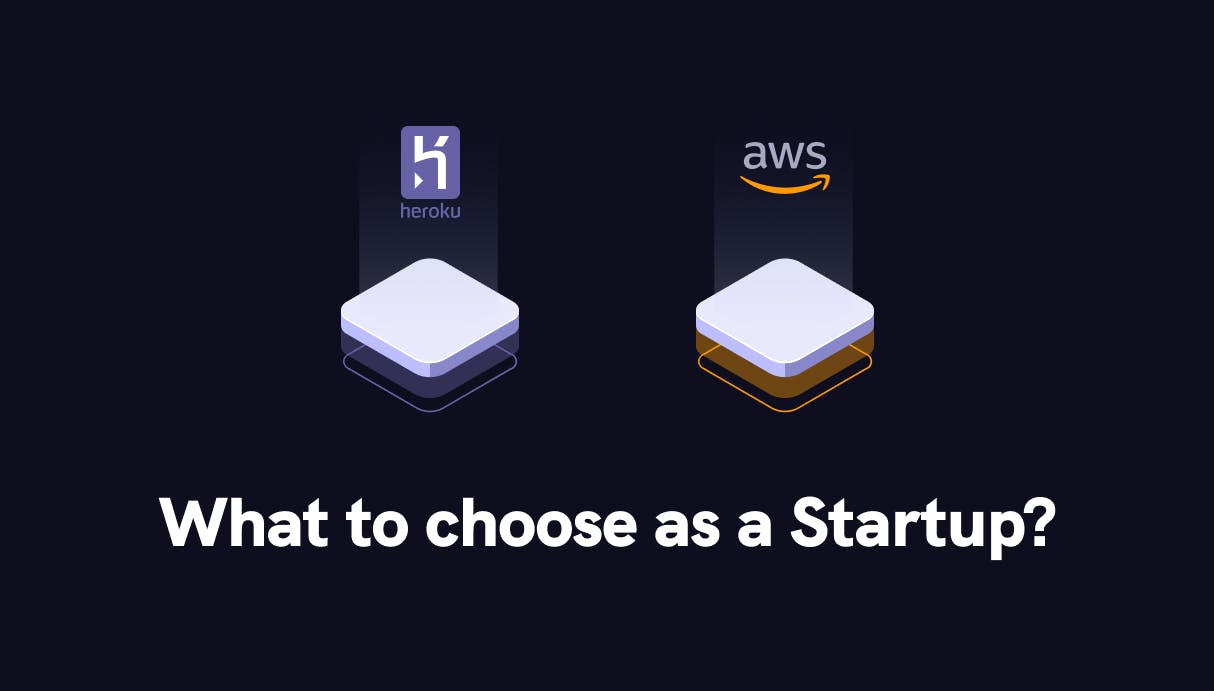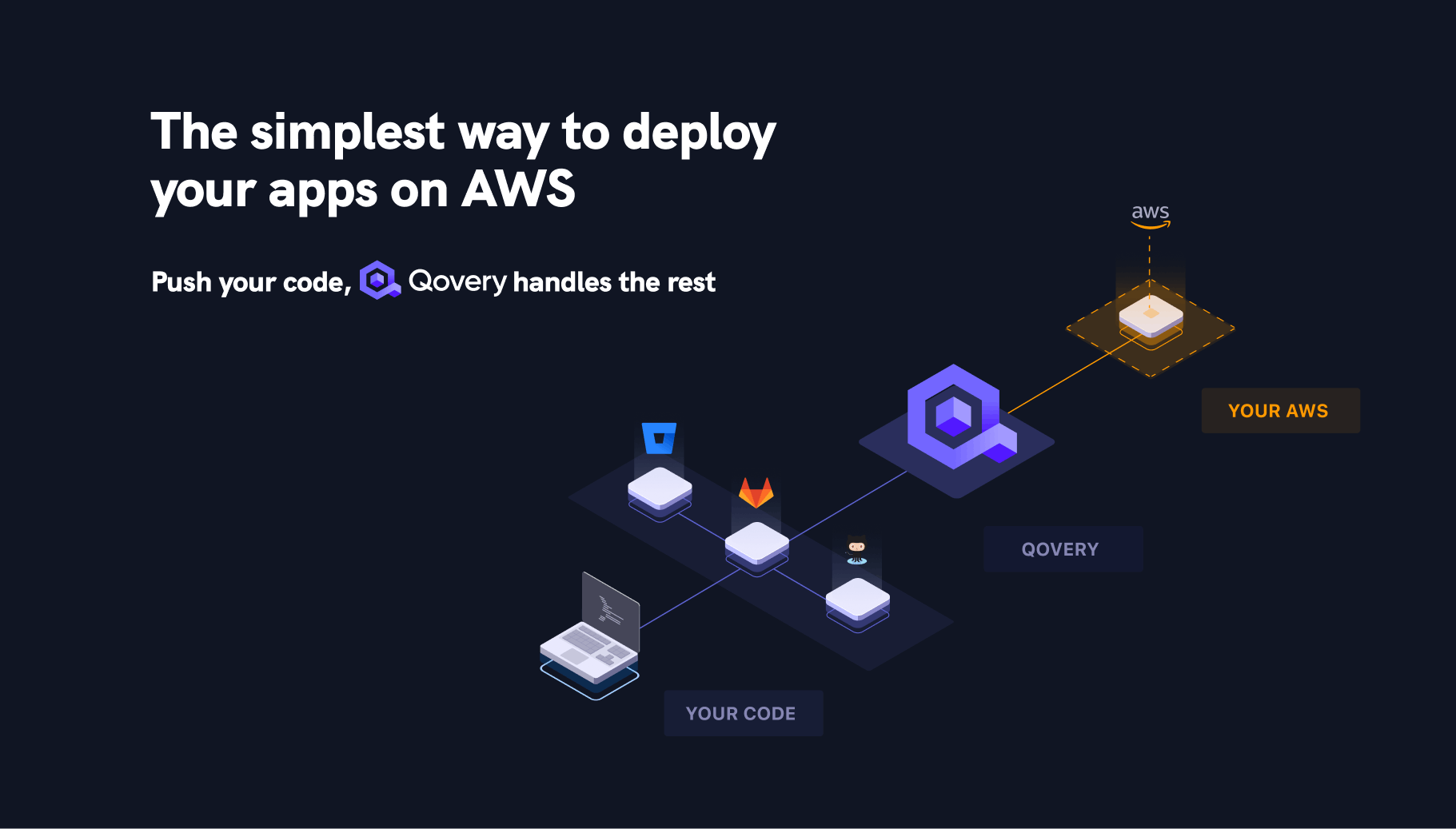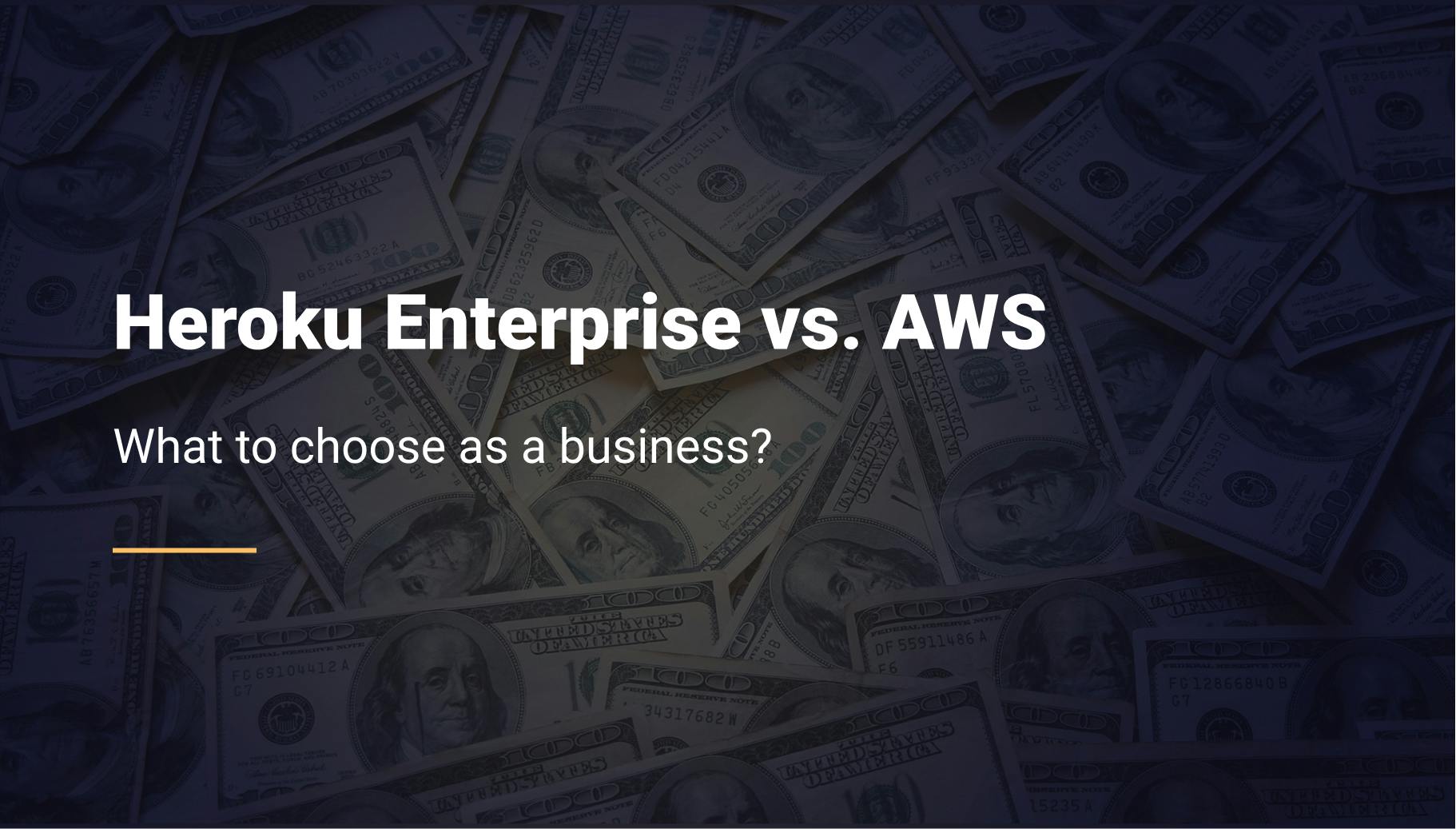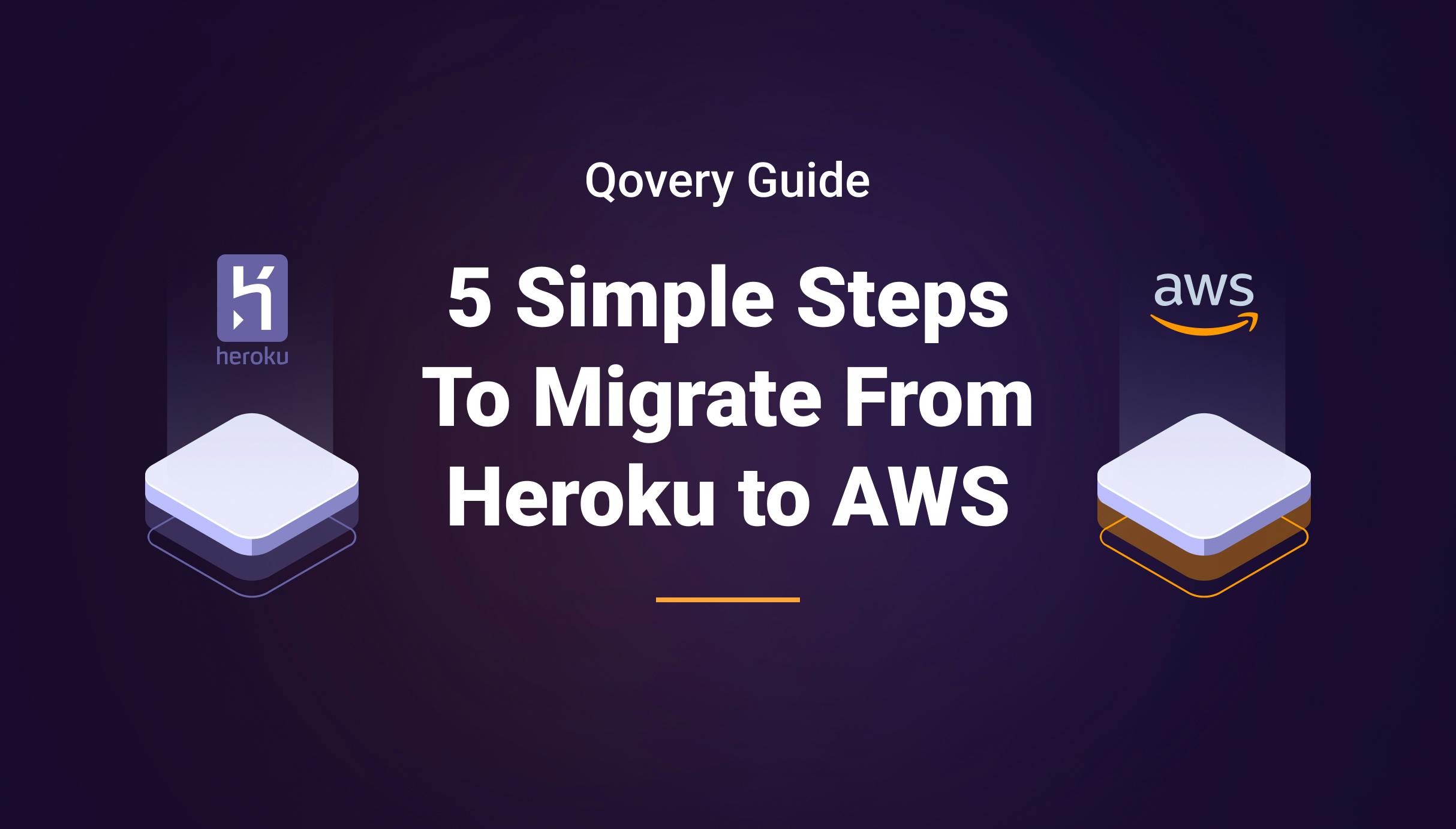Heroku vs AWS: differences & what to choose in 2024?
Cloud hosting has become an indispensable component of IT infrastructure. In this article, we delve into the comparison between two prominent cloud service providers: Amazon Web Services (AWS) and Heroku. We'll explore what each platform offers, their advantages and disadvantages, pricing, scaling capabilities, and developer experience, and ultimately, help you determine which is the right choice for your project needs. Whether you're aiming for simplicity and ease of use with Heroku or seeking flexibility and control with AWS, understanding the nuances of each platform will guide you in making an informed decision. Let's go!

Romaric Philogène
December 26, 2020 · 11 min read
#What is Amazon Web Services (AWS)?

Amazon Web Services or AWS are cloud services that offer infrastructure as a Service (IaaS). Among the many benefits it provides, it includes management and analytics with data. AWS has a wide range of cloud services. Amazon Simple Storage (S3) and Elastic Compute Cloud (EC2) are two popular and commonly used services. Elastic Compute Cloud (EC2) is a web service that controls computing resources in Amazon's computing environment. Amazon S3 is object storage that's built to store and retrieve data from the web. It offers performance, durability, availability, security, and virtually unlimited scalability at economical costs.
#Advantages of AWS
AWS provides flexibility and powerful infrastructure capabilities. AWS is best for complex solutions that require higher orchestration and maintenance when compared to Heroku. AWS supports complex applications like microservices easily. A DevOps team is needed to handle the complex management aspects of AWS, which leads to spending time on infrastructure management instead of product development.
The AWS with EC2 is suitable for running high-load applications that need immense computing power. AWS provides many automated functions like configuration and scaling, among others. Deployments are fast, with the ability to scale up infrastructure as per the needs of the project.
#Disadvantages of AWS
AWS has too many options for services that it becomes confusing at times. It becomes challenging to make a choice quickly for a solution. Deployments in AWS may be far from a simple operation, unlike the easy way that Heroku provides.
The developers will have to undertake many AWS management functions though AWS is attempting to automate the processes. A DevOps team or resources are needed to handle deployment issues and infrastructure.
#What is Heroku?

Heroku is a cloud-based platform that offers Platform as a Service (PaaS). Heroku is based on AWS.
However, its services are much simpler to use than the AWS Elastic Compute Cloud service. It is high on efficiency and support for building, deployment, and rapid scaling. One of its popularity is that it has add-on capabilities supporting multiple management tools and alerts.
Heroku is known to speed up development cycles as the infrastructure part is fully managed.
Let us explore the pros and cons of Heroku vs. AWS here.
#Advantages of Heroku
Heroku is a PaaS solution, and the key element is 'Dynos', a proprietary lightweight Linux container wherein all the app processes run. As a startup, you can focus on developing your app and deploy it to Heroku. Heroku automatically configures the required infrastructure and provisions resources like databases and storage for your app. There is no need to have a DevOps team in place, which is convenient for a startup with limited financial resources.
Heroku provides a great developer experience where your Git repository is your source of truth. Additionally, with Heroku, developers choose to build their apps in any language of their choice. They can speed up development with the help of Heroku add-ons. Some of the add-ons are free, while others are paid ones. Time savings and the simplicity of Heroku are significant advantages.
Heroku empowers developers with an entirely ready environment and app servers for use. The Heroku Command Line Interface (CLI) makes for easy management through the simple dashboard. It has easy and seamless integration with pre-existing development tools too.
#Disadvantages of Heroku
Heroku charges based on the number of 'Dynos' and the size of the Dynos required. If you have a larger app, then you will need to use more dynos. This can be an expensive proposition if your app is large and has lots of traffic as the cost of Dynos or Dynos workers are in the range of 35$ per month. So from a development perspective, it is built for small development teams comprising five or fewer members.
Heroku does not support complex applications like Microservices. It is not suitable for complex projects that require plenty of cloud resources. Plus, it hardly scales your team's needs.
#Differences between Heroku & AWS
#Heroku vs. AWS: features
| Heroku | AWS | |
|---|---|---|
| Features | - Fully flexible runtime environment with smart containers (dynos) system. - Manual horizontal and vertical scaling - Rollback your database or code in no time - App monitoring system to keep track of metrics, like response time, throughput, memory, etc. - Full GitHub Integration | - Multiple deployment options and the ability to roll back to the previous version - Automatic scaling of web apps based on their specific needs and defined conditions. - Quick restart of all app servers by using a single command - App metrics - Direct access to the processor and memory of the underlying server. - AWS Service Integration |
| Languages | - Ruby - Java - PHP - Python - Node.js - Go - Scala - Docker* *supported but not so simple as it was built before Docker does exist | - Any language is supported without any limitations but requires advanced knowledge |
| Addons and services | - Heroku offers hundreds of addons for various purposes like security, mailing, content management, testing, alerts, notifications. - About 700 pages of one-click-deployment third-party components and libraries are offered on the Heroku platform | - AWS includes over 200 services and more than 2000 features including computing, storage, databases, analytics, networking, mobile, developer tools, management tools, IoT, security, and enterprise applications. |
| Supported regions | - Heroku has 2 regions available for apps in the Common Runtime: Europe and USA, and 6 small regions for Private Spaces: Virginia, Oregon, Dublin, Frankfurt, Sydney, and Tokyo. | - AWS is available on a global scale in 190 countries and territories. |
| VPC | - Supported with Heroku Enterprise plan and the Shield option. Subscription with a one-year commitment at least. | - AWS includes VPC with no extra costs. |
| HIPAA and SOC2 compliance | - Same as for the VPC support. You need to have a Heroku Enterprise with the Shield option. | - AWS includes HIPAA and SOC2 compliance for their services and their infrastructure with no extra effort. E.g: Database encryption, VPC security group, Firewall, IP Static |
Heroku is a startup and beginner-friendly and easily integrates with many developer workflows. Its platform allows you to build an application using a customizable, self-regulating framework. This saves you time and money compared to starting an app from scratch. AWS works best with a DevOps engineer or development team since it isn't self-regulating. That gives them more control over the application and its various processes. It can help you build complex and sophisticated apps with multiple deployment options. You can even deploy your app in multiple places around the world at the same time.
#Heroku vs. AWS: pricing
| Heroku | AWS | |
|---|---|---|
| Cloud computing | Dyno: - standard 4 (30 GB RAM, 750 GB storage) - $750.00 per month - performance-m (2.5GB) - $250.00 per month - performance-l (14GB) - $500.00 per month | EC2: On-Demand Linux instances: - t3.micro (1GiB) – $0.0104 per hour - $7.48 per month - t3.small (2GiB) – $0.0208 per hour - $14.98 per month - c5.2xlarge (16GiB) – $0.34 per hour - $244.8 per month |
| Database | Heroku Postgres: - standard 4 (30 GB RAM, 750 GB storage, mono-AZ) $750.00 per month | RDS for PostgreSQL: - db.t3.large (30 GB RAM, 750GB storage, mono-AZ) $546 per month |
| In-memory storage (i.e., cache) | Heroku Redis: - Premium-9 (10GB) $1,450.00 per month | ElastiCache: - cache.r4.large (12.3 GiB) – $0.228 per hour - $164.16 per month |
| Object storage | - Heroku has nothing to offer. They recommend using Amazon S3 | |
| Data streaming | Apache Kafka: - Basic-2 - $175 per month | KDS: - 4 shard hours – $0.015 per hour - 527.04 million PUT Payload Units – $0.014 per 1,000,000 units - $50.58 per month |
| Support | Heroku offers three support options: - Standard - Free - Premium - Starts from $1,000 - Enterprise - Starts from $1,000 | AWS offers four support plans: Basic, Developer, Business, and Enterprise. - The Basic plan is provided to all customers - For the other plans, the price is calculated according to AWS usage for a particular amount of costs (For example, if you spend $5,000 on Amazon products, the price for support will be $500) |
Heroku gives you more time to focus on building applications but quickly gets expensive, especially when you plan to scale. AWS offers a variety of options and solutions to manage your hosting infrastructure and save your budget.
#Heroku vs. AWS: scaling
| Heroku | AWS | |
|---|---|---|
| Scaling capabilities | - Allows manual horizontal and vertical scaling using the Heroku dashboard or using a command-line interface. - It also offers autoscaling for Private Space dynos |
- Supports the AutoScale feature and has dedicated services for scaling and reserving computational capacities automatically. |
| Technical knowledge required | - Beginner | - Advanced |
| Cost | - Low cost when starting a project, very expensive on while scaling. | - High cost when starting a project, cost-effective while scaling. |
Both Heroku and AWS allow for scalability; the main difference is in the degree of technical knowledge required to scale up or down. In addition, deciding whether to scale with AWS or Heroku will include a significant cost difference.
#Heroku vs. AWS: Developer Experience
| Heroku | AWS | |
|---|---|---|
| Documentation | - Comprehensive documentation with step-by-step guides for every first-class language support and all Heroku essentials | - Every service of AWS is documented and comes with tutorials for various cases. Can become tedious to digest and time consuming |
| Deployment speed | - Quick deployment. To deploy an app on Heroku often need less than 30 minutes. - Offers a ready-to-use environment that allows deploying the code fast |
- The deployment process with AWS is quite complex, and launching multiple app instances for an app with the average workload can take a serious amount of time and requires skills. |
| Deployment Flexibility | - A self-regulating framework leads to less flexibility compared to IaaS platform opportunities. | - AWS provides developers with tools that give them full control over resources. |
| Technical knowledge required | - Beginner | - Advanced |
Heroku is known for the simplicity of its use. The deployment process is made easy using Git, and many DevOps routines are handled automatically. In return, Heroku offers less flexibility and control over the computing infrastructure. For its part, AWS provides excellent flexibility and much more control but requires a skilled specialist to manage the computing infrastructure.
#The Verdict
Heroku or AWS, both platforms have strong and weak sides. There is no straightforward answer to whether you should switch from Heroku to AWS, but we have listed above four things to consider when moving from Heroku to AWS and how to double-check if it makes sense for you.
But you need to understand what kind of feature your organization needs and how much you are ready to pay for them. You should also assess the skills and resources (especially DevOps) of your team before making your choice. The right platform is the one that helps you achieve your business goal while keeping your developers productive.
You also need to determine the skills sets (especially DevOps) in your team before you choose. The right platform helps you achieve your business goal and at the same time keeps your developers productive.
#Which is right for you?
In a nutshell, use Heroku if:
- You prioritize time over money (ideally if you want to build an MVP app, deploy, and test it)
- You don't have DevOps engineers in the team
- Your project is quite simple and doesn't require huge computing power
- You like Git ;)
Use AWS if:
- You need flexible infrastructure and more control over the server and environment configurations
- You have DevOps engineers in your team
- You need auto-scaling and support a more complex project (including microservices app)
- You don't want to be lock-in by a PaaS platform and its way of doing things
#Qovery - The simplicity of Heroku to your AWS account

The idea behind Qovery is to fill the gap between Heroku and AWS. Qovery brings the simplicity of Heroku to your AWS account. Give it a try now!
Read part II of this article - What to choose between Heroku and AWS in 2022 - with a detailed comparison.
Your Favorite DevOps Automation Platform
Qovery is a DevOps Automation Platform Helping 200+ Organizations To Ship Faster and Eliminate DevOps Hiring Needs
Try it out now!

Your Favorite DevOps Automation Platform
Qovery is a DevOps Automation Platform Helping 200+ Organizations To Ship Faster and Eliminate DevOps Hiring Needs
Try it out now!

